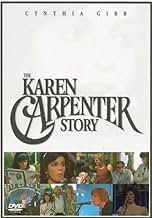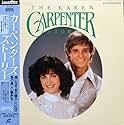The Karen Carpenter Story
- Téléfilm
- 1989
- 2h
Ajouter une intrigue dans votre langueStory of the meteoric rise and sudden fall of Karen Carpenter, who became a famous singer before battling anorexia and bulimia.Story of the meteoric rise and sudden fall of Karen Carpenter, who became a famous singer before battling anorexia and bulimia.Story of the meteoric rise and sudden fall of Karen Carpenter, who became a famous singer before battling anorexia and bulimia.
- Réalisation
- Scénario
- Casting principal
- Nommé pour 1 Primetime Emmy
- 1 nomination au total
- David Lattimer
- (as Kenneth David Gilman)
Avis à la une
ps my favorite song is Superstar. THAT VOICE!
The "controlling mother," need for romantic love, and career stresses all undoubtedly played a part. However, my feeling is that the act of moving Karen from her drums to the center stage mike was the real trigger.
The young musician felt comfortable and natural behind the drums. It was where she really belonged, despite professional dictates. A drummer's always a drummer at heart, sitting behind those traps and wielding those sticks. Her singing emanated from and was intertwined with the drumming, and not an isolated entity.
The move to center stage and abandoning her trap set was the beginning of Karen's downfall. The move robbed her of her base, grounding and natural habitat. It threw off her balance, and began her downward spiral to a rash of personal problems.
Seems like a small thing, yet my feeling is that had Karen remained behind those drums singing her songs, she might still be with us today.
The TV movie includes lots of great Carpenter hits, and includes the contribution of her protégé brother, Richard, who currently (in 2006) is alive and doing well in California.
Karen's problems were partly caused by her desire to be accepted and were intensely driven by her stage-demon of a mother, Agnes Carpenter. The problems perpetuated because her family lived in denial that a problem existed. They refused outside help until the damage to Karen's heart from her abuse of ipecac (which she eventually discontinued because she feared that it would damage her vocal cords) was irreversible.
The acting in the movie is good, and the songs are well-mixed, but it takes unreasonable liberties with reality. Over half of the scenes that Barry Morrow wrote were rejected by the family (mainly by Agnes Carpenter), who didn't want any negativity. It drove Morrow to the point where he refused to work on the movie any longer. His replacement had the same problem, and a third writer was brought in to finish. The whole thing is contrived, and to anybody who knew the actual situation, the movie has very little to do with how things really were.
Anybody who wants a realistic view of how things were should read the book "Little Girl Blue" by Randy Schmidt, which offers an objective view.
Le saviez-vous
- AnecdotesThe movie includes the house where Karen Carpenter died in real life, and the real-life ambulance and paramedics who were on the scene.
- GaffesThe film implies that Richard Carpenter talked Karen Carpenter out of making a solo album in 1979. Karen made a solo album, with the help of Phil Ramone, between 1979 and 1980. The Carpenters' label, A&M, didn't like it, so it wasn't released until 1996.
- Citations
Richard Carpenter: Hey give me the pizza.
Karen Carpenter: No it's my pizza.
Richard Carpenter: Come on.
Karen Carpenter: Richard, I...
Richard Carpenter: She said I'm in charge!
Karen Carpenter: Yeah, but not of this. Give me it back.
Richard Carpenter: Come on. I'm doing you a favor. In 10 or 20 years Mom and Dad are going to let you date and I don't want you to get fat.
- ConnexionsFeatured in Paul Williams: Still Alive (2011)
Meilleurs choix
Détails
- Date de sortie
- Pays d’origine
- Langue
- Aussi connu sous le nom de
- La historia de Karen Carpenter
- Lieux de tournage
- Société de production
- Voir plus de crédits d'entreprise sur IMDbPro
Contribuer à cette page






























